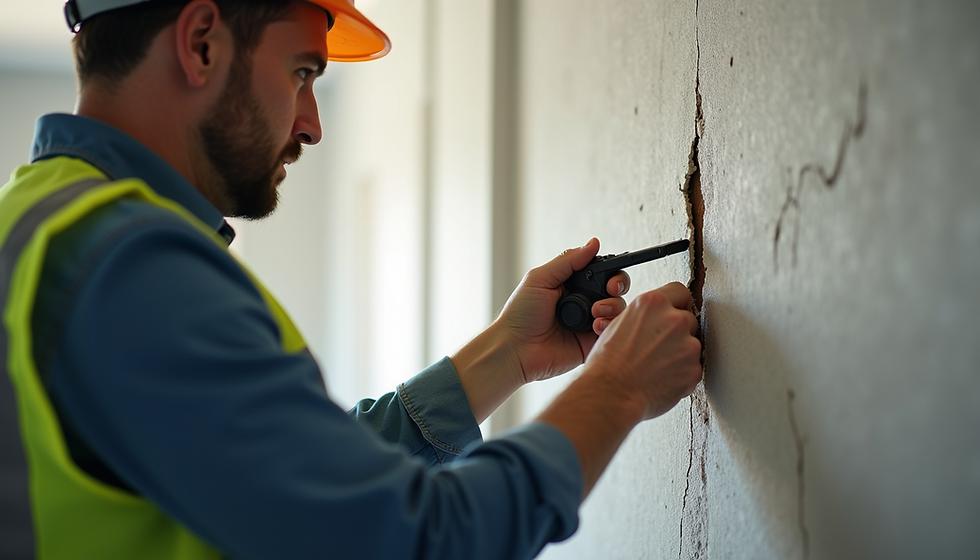Answers to Common Questions About Home Inspections
- John Gallagher
- May 12, 2025
- 4 min read
Updated: Jun 2, 2025
When buying or selling a home, one crucial step in the process is the home inspection. Home inspections can provide valuable information, discover potential problems, and ultimately aid in negotiation for repairs. However, many buyers and sellers have questions regarding the process and implications of home inspections. This blog post aims to answer common questions you may have about home inspections, so you feel informed and confident as you navigate this aspect of real estate.
What's A Home Inspections?
A home inspection is an examination of the physical structure and systems of a house, from the roof to the foundation. This process is typically carried out by a qualified inspector who reviews the condition of various elements such as plumbing, electrical systems, roofing, and insulation. Home inspections are essential for home buyers as they provide a comprehensive overview of the property’s condition, helping to identify issues that may need repair or replacement.
Following a home inspection, the inspector will generate a detailed report outlining their findings. This report highlights the condition of major components and any potential risks. Understanding this report can empower you to make informed decisions about your home purchase or sale.

Home inspections generally take about two to four hours, depending on the property's size. It is recommended that buyers attend the inspection to gain better insight into any issues discussed and to ask questions.
Why Are Home Inspections Important?
Home inspections play a pivotal role in real estate transactions. They protect buyers from unforeseen expenses and help sellers understand the marketability of their property. Here are a few reasons why home inspections are critical:
Identifying Issues Early: A home inspection can uncover hidden problems that might not be visible during a casual walkthrough. This can include issues with the plumbing, roofing, or structural integrity that could be costly to repair later.
Buyer Protection: Should the inspection reveal significant issues, buyers can decide whether to walk away from the potential money pit or be prepared to take on the work needed to make the home safe and habitable. This insight can lead to a substantial savings.
Peace of Mind: Knowing the general condition of a home can alleviate buyers' anxiety, providing assurance that they are making a wise investment.
An example of these benefits is seen in a recent report where over 70% of home buyers found at least one concern during their inspection, allowing them to address these issues before finalizing their purchase agreement.

What is a Deal Breaker in a Home Inspection?
This is completely up to the buyer and their willingness to accept minor defects and their ability to tackle major repairs or renovations Almost anything can be fixes, but the buyer has to decide if they want to take on the costs and scope associated with the rehabilitation of a home. Some of the major issues that can be revealed on an inspection include:
Structural Damage: Cracks in foundations or significant shifts in walls indicate substantial repair needs.
Mold and Water Damage: Visible mold or past water damage can lead to health risks and indicate systemic issues within the home.
Major Electrical or Plumbing Issues: Outdated electrical systems or antiquated plumbing that fails to meet modern standards can pose safety hazards, headaches, and financial liabilities.

How Long Does a Home Inspection Take?
The duration of a home inspection can vary based on several factors, including the size of the home and the complexity of its systems. On average, home inspections can last between two to four hours. Larger homes will typically take longer.
It's crucial to allocate adequate time for the inspection, allowing the inspector to thoroughly assess every aspect of the home. After the inspection, the inspector will typically prepare a detailed report that may take some additional time to produce.
Understanding the inspection duration will help both buyers and sellers manage their expectations during the home buying process.
What to Expect After a Home Inspection
After a home inspection, you can expect to receive a detailed report that outlines the inspector's findings. The report includes photographs, descriptions of issues, and recommendations for professionals who can make the repairs. Here's what you should consider after receiving the inspection report:
Review the Report: Take the time to read through the entire report carefully. Pay attention to the items noted as “major concern” or “due diligence.”
Prioritize Repairs: If you are the seller and the inspection identifies needed repairs, decide which items you want to address before closing. Buyers can use the report to communicate priorities..
Plan for Repairs: If significant issues are found, consider scheduling follow-up inspections or obtaining quotes from contractors to understand the potential financial implications.
Following these steps ensures that buyers and sellers make informed decisions based on the inspection's findings.
Final Tips for a Smooth Home Inspection Process
To make the home inspection process as smooth as possible, consider these final tips:
Be Present: As a buyer, attending the inspection gives you the opportunity to hear firsthand about issues and ask questions.
Choose a Qualified Inspector: Ensure that you opt for a home inspector who is certified, very experienced, and has good reviews. Not all Home Inspectors are the same!
Stay Open-Minded: Remember that no home is perfect. Approach the inspection findings objectively and use them as a tool to make the best decision for your circumstances.
If you have more questions regarding home inspections, you might find helpful information in the home inspection faq.




Comments